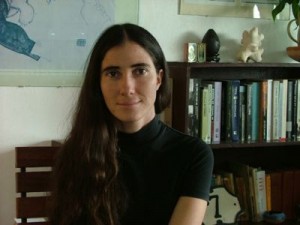As a philologist and a blogger since 2007, Yoani Sánchez has been a big part of the phenomenon, which has been described by some as “blogostróika” in Cuba. Her blog Generación Y [es] [1] is currently hosted on the portal Desde Cuba [es] [2], which happens to be blocked within the country since the last week of March 2008. However, it is still available by anonymous proxy. Together with Reinaldo Escobar, she has helped organize the “itinerant blogger gatherings [es] [3]” held during the past two months and is also on the jury for the blogging contest “A Virtual Island.”
She has been awarded with the Ortega and Gasset prize for journalism, the Bitácoras 2008 prize, and the BOBs organized by Deutsche Welle. On January 28, the new Voces Cubanas [es] [5] (Cuban Voices) project was launched, which aims to gather citizen bloggers from across the island. To date, there are 8 active blogs and 15 in development.
Claudia Cadelo: What are the goals of the new portal Voces Cubanas and how does it differ from Desde Cuba?
Yoani Sánchez: Voces Cubanas is a blogging platform and differs from Desde Cuba [es], which also contains a virtual magazine and other universal spaces. It is a website where all those who want to express ideas, put their projects online, can do so. It is born and inspired by the experience that we gained through the administration of other sites, but there is not an editorial policy that guides it, rather each blogger is his or her own director, editor and even censor.
CC: What does one need to do to have a blog in Voces Cubanas?
YS: The fundamental requirement for the new blogging platform is to live in and write from Cuba. Those who want a space at Voces Cubanas only needs to let us know in person or through an email to bloggers@vocescubanas.com. We'll help them with a proposal for a design and we'll teach them ways to administer their own blog themselves. We accept any type of subject matter, only when it does not incite violence, pornography, racist or discriminatory propaganda.
CC: What are the blog that are hosted on the site so far, could you make a brief introduction to each one?
YS: By the end of February we have had 7 blogs, and little by little we will have another 3. The greatest difficulty to have these blogs ready is internet access. Since we cannot have internet connection at home, we are forced to use public sites, usually hotels or others sites that are very expensive to use. Nevertheless, we have been building Voces Cubanas without trying to do it all at once, despite the limitations and obstacles that Cubans face when trying to develop projects in the virtual world.
To date, there are the blogs Reportes de Viaje [es] [6] (Travel Reports) written by Henry Constantin from the province of Camagüey, Veritas [es] [7] written by Eugenio Leal is dedicated to opinion surveys, my blog Generación Y has a mirror on the domain Desde Cuba, the independent journalist Iván García has a blog called Desde La Habana [es] [8] (From Havana), and we are working with the blogs Octavo Cerco [es] [9] by Claudia Cadelo, Habanemia [es] [10] by Lía Villares and Lunes de Post Revolución [es] [11] by Orlando Luís Pardo Lazo.
CC: What is the concept of blogostróika? Do you feel that blogs can contribute towards the expansion of freedoms for the Cuban people?
YS: The idea of calling this new phenomenon with the label of blogostróika came from Cuban writing their blogs from exile. They called this new wave of personal and collective sites with Cuban themes that have appeared in the past five years. The use of this term is a clear allusion to the process that came about when Mikhail Gorbachev came to power, especially during the information transparency process called glasnost. Even though the term sounds nice, I have to make a small comment that perestroika was pushed from a position of power, while the alternative Cuban blogosphere did not ask permission from anyone to exist.
CC: Talk to me about how your experiences with all of the international recognition that you have received and talk about the different stages of your life, before you were a blogger, as a blogger and as a blogger that traveled distances to teach people how to open a blog. What can you say? Have you changed? Have you discovered something about yourself?
YS: My life has changed in many aspects, while others remain the same. Ever since the foreign press discovered my blog, I have received many interview requests, offers for collaboration, and messages of encouragement. I was a person profoundly shy and I had to evolve and adapt when people on the street recognized me and even asked for my autograph. I have also learned to live with the unjust judgements against me, the acts of defamation, the lies to make me out to be an employee of the CIA. My family has seen my free time decrease, but they have given me all of the support to free from daily chores.
What I have learned the most during these two years of blogging is the what an ordinary citizen can achieve, of the immense power that is hidden within each individual.
CC: What do you hope for the future of the Cuban blogosphere?
YS: I hope that it becomes more numerous and more pluralistic. I have the feeling that the Cuban blogosphere will play an important role in the democratization of Cuba and in the field of public opinion. That it will be healthy for a long time because there is a lot to tell and many ways of doing so, and I don't see that it is time to run out.
